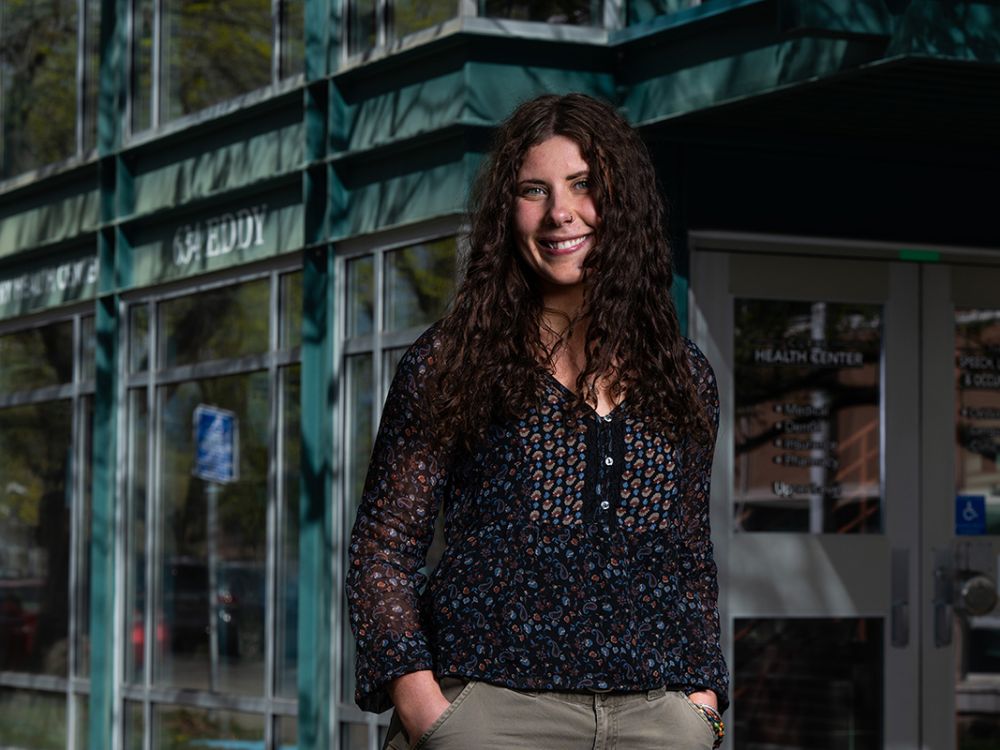By Cary Shimek, UM News Service
MISSOULA – Taylor Sadewic vividly remembers the moment that changed the trajectory of her life.
As a high school freshman and avid 4-H’er from Sandpoint, Idaho, she was retrieving her horse from a barn when she saw a woman giving riding lessons to people with autism and other disabilities. She saw people who might have limited communication abilities and social skills connect with the horses in beautiful ways.
She became fascinated.
“I was like, ‘Please let me help you. I want to get involved in this,’” she said. “And eventually I started babysitting for one of the families, and there was this 5-year-old girl, and we became very close. And it just felt like my calling that I really wanted to work with this population of people.”
Jump forward eight years, and Sadewic is preparing to graduate from the 91次元 with a bachelor’s degree in communicative sciences and disorders. And during her time at the University, she helped many UM students and others in the surrounding community who are neurodiverse.
“I found this passion for working with people with autism, which set me on this path toward becoming a speech pathologist,” she said.
At UM, Sadewic became involved with MOSSAIC, a program that uses evidence-based practices to support people with autism and related disorders. (MOSSAIC stands for Mentoring, Organization and Social Support for Autism/All Inclusion on Campus.) The program is a mentoring and service-learning course for CSD students, but it’s open to all campus majors. Sadewic started with MOSSAIC as a peer mentor and then rose to the rank of a student director the past two years.
“We have a social night – that I get to plan – in which people can come to a safe place and be completely themselves,” she said. “They have a community of people who know what it’s like to experience autism and a community of people who know how to support individuals with autism.”
Sadewic said MOSSAIC social nights were at their largest this past semester, with 14 student peers and about 20 participants from UM and the surrounding community. They participate in activities like a puppy party – animal therapy in which everyone engages with puppies for a couple hours. They also have game nights, bus downtown for ice cream, go skating on the Oval or share their favorite YouTube videos.
She said individuals with autism have specialized interests and oftentimes don’t have spaces to share these interests. She organizes nights where every person gets to share their passions with the group.
“It’s all about helping them build their social skills, which can be so hard for people with autism,” Sadewic said. “And we’ve seen people texting each other outside of MOSSAIC and making plans to hang out, and that type of reaching out to someone can be really hard. And this semester I’ve really seen them able to do that in new ways, and it’s been really cool.”
She said the social nights are designed to give people a community and understand they are worthy of friendship and connection with others.
“They come in knowing that they’re going to have friends in this place and that they are welcomed and loved and going to be celebrated,” Sadewic said. “We also check that our participants are being cared for.”
If participants haven’t shown up in a few weeks, Sadewic will reach out to them. She also works to connect them to campus resources if they are struggling. She will take on tasks like helping students navigate the UM Writing Center or use the library if they need assistance.
Jennifer Schoffer Closson directs the MOSSAIC program and has served as a mentor for Sadewic at UM.
“Taylor is great at fostering an inclusive space, so everyone feels welcome and safe at our MOSSIAC socials,” Schoffer Closson said. “She also has fun ideas, so we have high attendance. Taylor’s use of evidence-based practices to support our neurodivergent friends truly has made a positive impact on the campus community.
“Working with Taylor has been a true pleasure,” she continued. “It’s been more like working with a colleague than mentoring a student because of her talents and ability to bring what she learned in the classroom to practical settings.”
Sadewic also was involved with UM’s Meaningful Intervention for NeuroDiversity Lab. She and two other student research partners worked on a pilot project, trying to understand how individuals with autism interact with first responders. The goal was to provide improved guidance for first responders. Sadewic interviewed the parents of children with autism, while her partners interviewed the individuals themselves and emergency personnel. The student researchers presented their findings at a conference in Alaska.
Sadewic initially chose UM because it had a major that interested her and the proximity to her Idaho hometown. As a Provost Honors Scholar, she also was awarded a prestigious scholarship with UM’s , which provides a focused and rigorous learning environment with smaller classes for top students. During her time at UM, she also studied abroad for a semester at the University of Waikato in New Zealand.
As she prepares to graduate on May 10, Sadewic’s future trajectory will involve taking off a year or two before pursuing graduate school to become a fully licensed speech language pathologist. She intends to work part time as a speech language pathology assistant in an area school while also serving as a missionary for her church.
“I’ll stay in Missoula for now,” she said. “I am very happy I came here.”
###
Contact: Dave Kuntz, UM director of strategic communications, 406-243-5659, dave.kuntz@umontana.edu.
